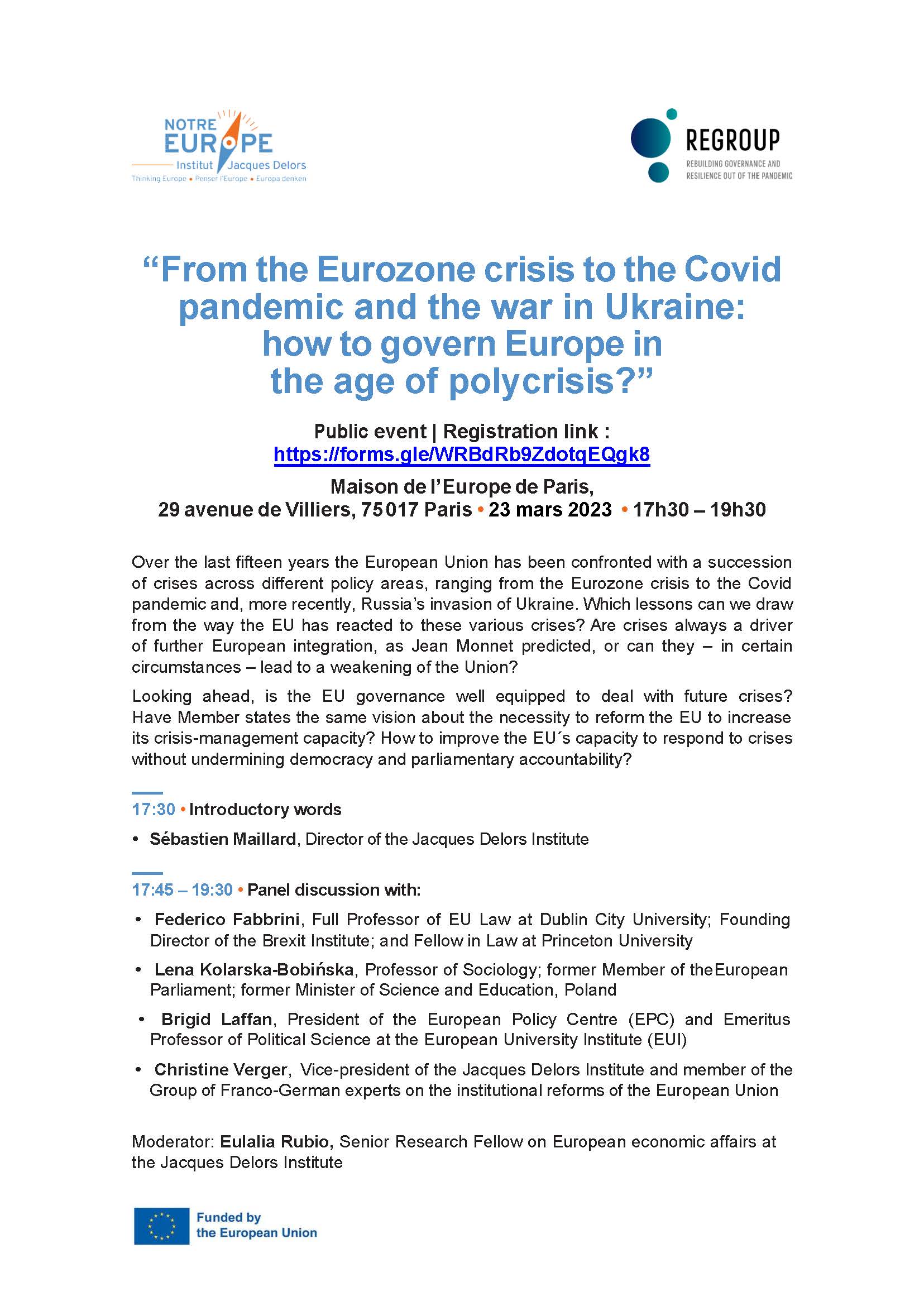Public Event | “From the Eurozone crisis to the Covid pandemic and the war in Ukraine: how to govern Europe in the age of polycrisis?”
Over the last fifteen years the European Union has been confronted with a succession of crises across different policy areas, ranging from the Eurozone crisis to the Covid pandemic and, more recently, Russia’s invasion of Ukraine. Which lessons can we draw from the way the EU has reacted to these various crises? Are crises always a driver of further European integration, as Jean Monnet predicted, or can they – in certain circumstances – lead to a weakening of the Union?
Looking ahead, is the EU governance well equipped to deal with future crises? Have Member states the same vision about the necessity to reform the EU to increase its crisis-management capacity? How to improve the EU´s capacity to respond to crises without undermining democracy and parliamentary accountability?
17:30 • Introductory words
• Sébastien Maillard, Director of the Jacques Delors Institute
17:45 – 19:30 • Panel discussion with:
• Federico Fabbrini, Full Professor of European Law at the School of Law & Government of Dublin City University (DCU), Director of the Law Research Centre and founding director of the DCU Brexit Institute
• Lena Kolarska-Bobińska, Professor of Sociology; former Member of the European Parliament; former Minister of Science and Education, Poland
• Brigid Laffan, President of the European Policy Centre (EPC) and Emeritus Professor of Political Science at the European University Institute (EUI)
• Christine Verger, Vice-president of the Jacques Delors Institute and member of the Group of Franco-German experts on the institutional reforms of the European Union
Moderator: Eulalia Rubio, Senior Research Fellow on European economic affairs at the Jacques Delors Institute
Over the last fifteen years the European Union has been confronted with a succession of crises across different policy areas, ranging from the Eurozone crisis to the Covid pandemic and, more recently, Russia’s invasion of Ukraine. Which lessons can we draw from the way the EU has reacted to these various crises? Are crises always a driver of further European integration, as Jean Monnet predicted, or can they – in certain circumstances – lead to a weakening of the Union?
Looking ahead, is the EU governance well equipped to deal with future crises? Have Member states the same vision about the necessity to reform the EU to increase its crisis-management capacity? How to improve the EU´s capacity to respond to crises without undermining democracy and parliamentary accountability?
17:30 • Introductory words
• Sébastien Maillard, Director of the Jacques Delors Institute
17:45 – 19:30 • Panel discussion with:
• Federico Fabbrini, Full Professor of European Law at the School of Law & Government of Dublin City University (DCU), Director of the Law Research Centre and founding director of the DCU Brexit Institute
• Lena Kolarska-Bobińska, Professor of Sociology; former Member of the European Parliament; former Minister of Science and Education, Poland
• Brigid Laffan, President of the European Policy Centre (EPC) and Emeritus Professor of Political Science at the European University Institute (EUI)
• Christine Verger, Vice-president of the Jacques Delors Institute and member of the Group of Franco-German experts on the institutional reforms of the European Union
Moderator: Eulalia Rubio, Senior Research Fellow on European economic affairs at the Jacques Delors Institute
Maison de l'Europe - 29 avenue de Villiers - 75017 Paris









